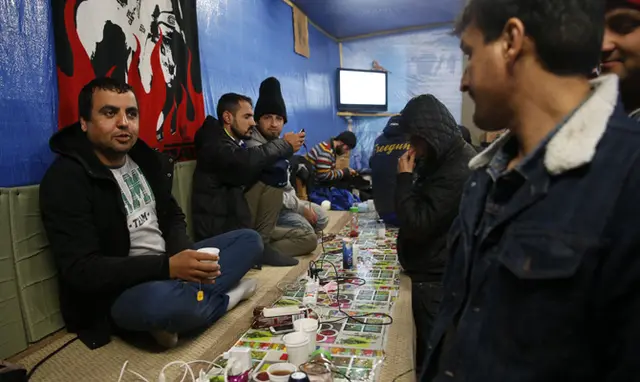(Xinhua) -- Europe has this year faced its largest wave of migration since the end of World War II. Considered a challenge for the Schengen free movement area, the crisis has forced some member states to introduce border controls.
Almost a million migrants are estimated to have arrived on European shores by sea alone in 2015, according to the International Organization for Migration, while the European statistics agency Eurostat has counted 980,000 asylum requests across EU member states so far this year.
"This crisis is extraordinary," said Etienne Reuter, a former senior advisor at the European Commission, in an interview with Xinhua. "The order of magnitude is extreme and it confronts the European Union and its member states with unprecedented challenges. "
In September, the European Commission set out a refugee relocation mechanism, setting a quota for the number of migrants each state must accommodate. Germany's quota was the highest, followed by France, Spain, Poland and the Netherlands.
As European leaders gathered in Brussels on Thursday and Friday for an end-of-year summit to discuss the migrant crisis, big questions remain about how this extraordinary situation will unfold and what the future has in store for those who made the harrowing journey to Europe in search of a better life.
HOW GOVERNMENTS HAVE RESPONDED
While the biggest strain has been on Germany, the mass influx of people has tested all EU countries' migration policies and capacity to deal with asylum seekers.
Neighboring Belgium, for example, has been faced with its biggest backlog of asylum requests in 15 years, with more than 1, 000 applications made in the first two weeks of December alone.
The extent to which the country's administration became overloaded was seen when Belgian immigration minister Theo Francken launched campaigns on social media telling Afghan and Iraqi migrants to stop trying, as they stood little chance of gaining asylum in his country.
Meanwhile, the UK government has pledged to resettle 20,000 Syrian refugees by 2020, the first 1,000 of whom have just arrived in Britain in time for Christmas.The legal framework on
accepting migrants stems from the Dublin Convention, adopted in 1990 and ratified seven years later.
"Receiving refugees is a legal and moral obligation for the EU, but one must distinguish between political refugees and economic migrants. The EU must show unity, generosity and solidarity in order to ensure the application of international law," Reuter said.
BIG ISSUE OF INTEGRATION
Reuter believed that Europe had "the capacity to absorb large numbers of refugees," but he said there was, among some people, an "element of fear which intensified after the attacks in Paris" after it emerged that some of the alleged perpetrators had snuck in with the flow of refugees arriving in Europe.
"We must make a big effort to fight against this fear," he added.
But what can be done to help refugees integrate into their newly adopted European home? A crucial element is helping them find work. According to the UN refugee agency UNHCR, nearly half of the people arriving in Greece after fleeing conflict in Syria have a university education.
In some sectors in Europe, it appears there is a clear demand for extra manpower, which could be met by the new wave of arrivals.
For example, several industries in Flanders, the Dutch-speaking northern half of Belgium, have expressed an interest in offering work to Syrian refugees, such as the construction sector which has been struggling for years to fill vacancies.
"We find that among these refugees, there are well-educated and technically trained people," one building industry spokesman said. "Many of them already speak English, which makes the integration easier."
Reuter agreed: "Central to the integration of refugees in European countries should be the possibility for them to find work and earn a living instead of living off social assistance. It is also a question of dignity."
Some countries, including Belgium where this week's EU migration talks were held, have introduced a compulsory integration program for new migrants arriving in the country, including welfare advice, citizenship lessons, help with training and finding a job, and language lessons.
"It seems legitimate and appropriate to have a message for refugees arriving in our countries, encouraging them to use discretion regarding their religion and customs. But there should also be a message of tolerance for the host populations," said Reuter.
WHAT NEXT?
For some, however, the reality on arrival does not match the expectation. Several countries have in place a system of voluntary returns for asylum seekers who wish to abandon their plans to obtain refugee status and be flown back home. More than 800 Iraqi asylum seekers in Belgium alone have taken the government up on this offer this year.
What motivates someone who has travelled so far, in such hazardous conditions, to do a U-turn and return to their troubled country?
One Afghan migrant recently told Belgian newspaper Le Soir: "I' m going back for family reasons, but also because I'm disappointed with the welcome I received. I spent three nights sleeping outside before I could even get into the immigration office. The procedure is so long."
For 2016, the EU budget has set aside more than 4 billion euros (4.32 billion U.S. dollars) to address the refugee crisis both in the EU and in the countries the refugees departed from. This brings the total funding for the refugee crisis in 2015 and 2016 to close to 10 billion euros.
Meanwhile, the UNHCR and the European Commission recently launched a program to provide 20,000 additional reception places for asylum seekers in Greece. The Mediterranean crossing is treacherous and the risk of drowning is real. But still refugees are arriving every day on Greek shores.
There is no end in sight for a crisis that has put Europe to the test over the past year.
 简体中文
简体中文

